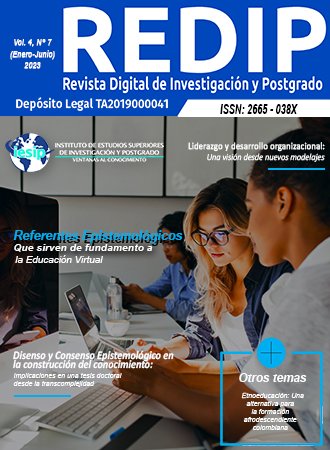Dissent and epistemological consensus in the construction of knowledge
Implications in a doctoral thesis from transcomplexity
DOI:
https://doi.org/10.59654/dzh4rb73Keywords:
Doctoral research, epistemological dissent, epistemological ruptures, epistemological consensus, transcomplexity, translanguage.Abstract
Reflecting in depth to deploy a set of epistemic arguments around the epistemological dissent and consensus of a transepistemology under construction, as we have called transcomplexity, undoubtedly constitutes a very expensive intellectual commission, since a daring of this magnitude involves confront the most guarded ontoepistemological fiefdoms of established scientific rationalities. Theoretically,
the article is based on the great contributions of Rogers Verneaux (1989) about General or Critical Epistemology of Knowledge as a didactic union to philosophy. The article allows to conclude that the construction of knowledge in the context of a doctoral level research, thought from transcomplexity, reveals, on the one hand, the emergence of an epistemological dissent understood as a paradigmatic disobedience and a necessary criticism of knowledge, as a purpose to achieve the transformation and progress of science, and on the other, the convenience of maturing certain consensuses and / or agreements around some epistemic premises that must be shared by the academic community, in order to collectively build the scientific identity of transcomplexity, which we assume as a transepistemology under construction. I call these premises the ontological eidos of transcomplexity,
made up of: the principles of the Transcomplexity Integrative Approach, the philosophical dimensions of the epistemic matrix of transcomplexity, some portals of human wisdom to build the doctoral / postdoctoral discourse from the transcomplexity and a translanguage of a critical, transgressive and transformative nature.
Downloads
References
Balza, A. (2010).Complejidad, Transdisciplinariedad y Transcomplejidad. Los Caminos de la Nueva Ciencia. Ediciones APROUNESR, Caracas.
Balza, A. (2013). Pensar la Investigación Postdoctoral desde una Perspectiva Transcompleja. REDIT. San Juan de los Morros.
Balza, A. (2020). La Transcomplejidad. Un Modo de Pensar y Comprender la Trama de la Vida del Ser Humano. Editorial Académica Española. Mauricio.
Balza, A. y Schavino, N. (2020). El Umbral de las Transciencias Sociales. Un Debate Necesario desde la Transcomplejidad. Ediciones FEDEREDIT, San Joaquín de Turmero, Venezuela
Garrido, L. (2011). Teoría de la Acción Comunicativa de Habermas. http://www.razonypalabra.org.mx/N/N75/ultimas/38_Garrido_M75.pdf
Kuhn, T. (1962). La Estructura de las Revoluciones Científicas, Editorial University, of Chicago Press.
Luca, M. (2014). El Consenso como Concepto Filosófico-Político. Contribución a la Historia y a la Recomposición de un Rompe cabeza Teorico. http://www.redalyc.org/articulo.ca.55430922002.
Meyenberg, L. Y (2013). Cuatro Esbozos Teóricos para Pensar en el Consenso. https://dialnet.unirioja.es/servlet/articulo?codigo=5141836
Morin, E. (1994). El Metodo III. El Conocimiento del Conocimiento. Madrid, España, Cátedra.
Ramírez, S. (2012). Crítica al Conocimiento. Estudios Sociales de la Ciencia y Transformación Crítica de la Práctica Epistémica. https://www.google.com/url?sa=t&rct=j&q=&esrc=s&source=web&cd=&cad=rja&uact=8&ved=2ahUKEwjyzPb0up6BAxU2mbAFHSMiD-UQFnoECBMQAQ&url=http%3A%2F%2Fwww.scielo.org.mx%2Fscielo.php%3Fscript%3Dsci_arttext%26pid%3DS1870-00632012000100015&usg=AOvVaw2I_XtNza_D2A_ybdVBw90F&opi=89978449
Russell, B. (1970). Los problemas de la Filosofía. https://www.filosofem.cat/IMG/pdf/russell_los_problemas_de_la_filosofia-2.pdf
Schavino, N. (2012). El Enfoque integrador transcomplejo y la investigación educativa. En: La transcomplejidad una nueva visión del conocimiento. Maracay: REDIT.
Tarki, A. (2010). La Concepción Semántica de la Verdad y la Fundamentación Semántica. http://serbal.pntic.mec.es/~cmunoz11/tarski.pdf
Verneaux, R. (1989). Epistemología General o Crítica al Conocimiento. Un acercamiento didáctico a la filosofía. Editorial Gerdel.
Villegas, C. (2012). Resignificación de la Educacion desde la Transcomplejidad. Maracay, Encuentro de educadores.
Zaa, J. (2020). Transcomplejidad desde la Filosofía. https://www.google.com/url?sa=t&rct=j&q=&esrc=s&source=web&cd=&cad=rja&uact=8&ved=2ahUKEwi3t-7YvZ6BAxVQTjABHWpmBgoQFnoECBAQAw&url=https%3A%2F%2Freditve.wordpress.com%2F2020%2F02%2F21%2Ftranscomplejidad-desde-la-filosofia%2F%23%3A~%3Atext%3DEs%2520un%2520estado%2520de%2520conciencia%2Cy%2520f%25C3%25ADsicas%2520del%2520ser%2520humano.&usg=AOvVaw27HYHuxBt_wT5mrsC7YKhT&opi=89978449
Published
Issue
Section
License
Copyright (c) 2024 Revista Digital de Investigación y Postgrado

This work is licensed under a Creative Commons Attribution-NonCommercial-ShareAlike 4.0 International License.










